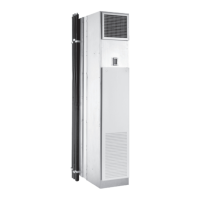SECTION V – Routine Maintenance (All Models)
Each unit on a job will have its own unique operating
environment and conditions which may dictate a
maintenance schedule that diers from other units on a job.
A formal schedule of regular maintenance and an individual
unit log should be established and maintained. This will help
to achieve the maximum performance and service life of
each unit on the job.
Information regarding safety precautions contained
in the preface at the beginning of this manual should
be followed during any service and maintenance
operations.
For more detailed information concerning service operations
consult your sales representative or the factory.
Motor/Blower Assembly
The type of fan operation is determined by the control
components and their method of wiring. This may vary from
unit to unit. Refer to the wiring diagram that is attached to
each unit for that unit’s individual operating characteristics.
All motors have permanently lubricated bearings. No eld
lubrication is required.
Should the assembly require more extensive service, the
motor/blower assembly may be removed from the unit to
facilitate such operations as motor or blower wheel/housing
replacement, etc.
Dirt and dust should not be allowed to accumulate on the
blower wheel or housing. This can result in an unbalanced
blower wheel condition which can damage a blower
wheel or motor. The wheel and housing may be cleaned
periodically using a vacuum cleaner and a brush taking care
not to dislodge the factory balancing weights on the blower
wheel blades.
Coil
Coils may be cleaned by removing the lter and brushing the
entering air face between ns with a sti brush. Care should
be taken to not damage coil ns. Brushing should be
followed by cleaning with a vacuum cleaner. If a compressed
air source is available, the coil may also be cleaned by
blowing air through the coil ns from the leaving air face.
This should again be followed by vacuuming. Units provided
with the proper type of air lters, replaced regularly, will
require less frequent coil cleaning.
Electric Resistance Heater Assembly
Electric resistance heaters typically require no normal
periodic maintenance when unit air lters are changed
properly. The operation and service life may be aected by
other conditions and equipment in the system. The two
most important operating conditions for an electric heater
are proper air ow and proper supply voltage. High supply
voltage and/or poorly distributed or insucient air ow over
the element will result in element overheating. This condition
may result in the heater cycling on the high-limit thermal
cutout. The high-limit thermal cutout device is a safety device
only and is not intended for continuous operation. With
proper unit application and operation, the high-limit thermal
cutout will not operate. This device only operates when a
problem exists, and ANY condition that causes high-limit
cutout MUST be corrected immediately. High supply voltage
also causes excessive amperage draw and may trip the circuit
breaker or blow the fuses on the incoming power supply.
After proper air ow and supply power are assured, regular
lter maintenance is important to provide clean air over the
heater. Dirt that is allowed to deposit on the heating element
will cause hot spots and eventual element burn through.
These hot spots will normally not be enough to trip the high-
limit thermal cutout device and may not be evident until
actual heater element failure.
Electrical Wiring and Controls
The electrical operation of each unit is determined by the
components and wiring of the unit. This may vary from unit to
unit. Consult the wiring diagram attached to the unit for the
actual type and number of controls provided on each unit.
The integrity of all electrical connections should be veried
at least twice during the rst year of operation.
22
22

